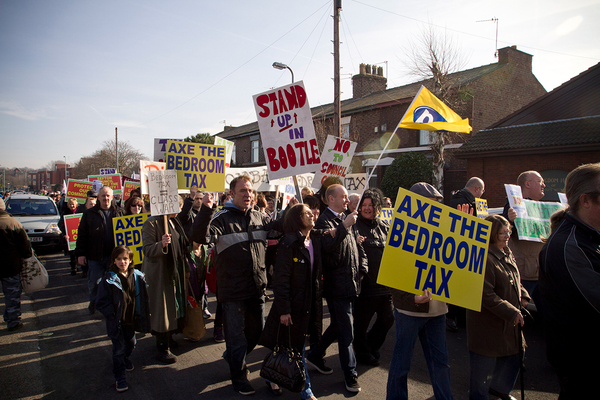You are viewing 1 of your 1 free articles
Bedroom tax hit could increase homelessness, warns Northern Ireland auditor general
Homelessness and food bank use could rise in Northern Ireland next year when measures to ease the impact of the bedroom tax expire, the region’s auditor general has warned.
In a report published yesterday, the Northern Ireland Audit Office said Westminster-imposed welfare reforms are “likely to have a major impact on housing in Northern Ireland”.
It warned that the removal of the spare room subsidy – commonly called the bedroom tax – could hit hard in 2020 because of a shortage of smaller homes in the region.
As one of its last acts before collapsing in January 2017, Northern Ireland’s power-sharing government introduced mitigation payments to shield social housing tenants from the bedroom tax and other welfare reforms.
However, the payments are due to end in March 2020 with no ministers in place to extend them – meaning tens of thousands of households could suddenly start seeing their benefits cut.
The report said this “could threaten the financial stability of housing associations posing a risk to both the building and maintenance of social housing in the future”.
And it said the Northern Ireland Housing Executive (NIHE), which owns more than 85,000 homes, would have to start collecting £15.6m in extra rent from its 25,000 tenants who will be hit by the bedroom tax, plus another £900,000 for the 350 tenants subject to the benefit cap once mitigation payments end.
Meanwhile, the NIHE estimates that its rent arrears will increase by £1.6m in 2018/19 as more tenants switch to Universal Credit.
Together, the end of the mitigation payments and the roll-out of Universal Credit pose “significant financial risk” to the housing authority, the report said.
Kieran Donnelly, comptroller and auditor general for Northern Ireland, said: “Northern Ireland has been insulated from the full impact of welfare reforms by the availability of mitigation schemes and local flexibilities.
“When the mitigation schemes end, there is a risk that we will see the same hardship and increase in the demand for food banks, reported elsewhere in the UK.
“The Department [for Communities]’s current review of mitigations should focus on what actions need to be taken to address this very real risk.”
Patrick Thompson, deputy chief executive of the Northern Ireland Federation of Housing Associations, said it “seems likely” that the mitigation payments will end in 2020.
He added: “We now have a very real and looming problem of the current housing stock profile not being able to assist the thousands of social tenants who may be under-occupying larger homes, as there aren’t enough smaller homes available for them to move to.
“With no functioning Northern Ireland Assembly, there are no signs that there are plans to encourage the construction of more suitably sized properties to offset the ending of the mitigations.
“And if there were, it is unlikely that there would be sufficient numbers built within a suitable timeframe to enable tenants to avoid bedroom tax.”
A spokesperson for the Department for the Communities said: “The department welcomes the report from the Northern Ireland Audit Office, and is pleased with the auditor general’s assessment that considerable progress has been made to date by the department in managing the implementation of a complex programme of welfare reforms as well as new systems that have been introduced for administering mitigation measures.
“However, until the formal audit process is fully complete, which includes a response from the department to the report’s recommendations, it is not in a position to comment at this stage.”












